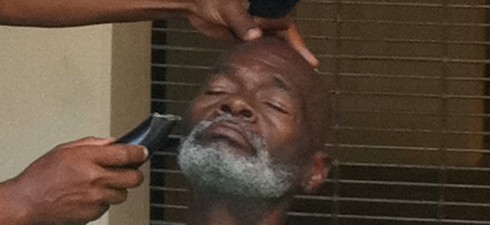Atlanta, Georgia, my adopted ‘hometown,’ has the 5th highest homeless population in the US, with an estimated 13,000 homeless men and women. Last week I introduced you to Allison Mitchell, Executive Director of Lazarus Ministries in Atlanta. You can read more about Lazarus and it’s mission here.
When you meet Allison, you are at first struck by her easy smile and Jersey Girl persona. She is tough, but feminine. She’s not very big, but you also get the impression she doesn’t put up with much. She is humble and unassuming, preferring to talk about the work to talking about herself. Last week you read about the birth of Lazarus as an organization: Allison and her friend were turned away as volunteers at a local Thanksgiving dinner for the homeless, and ended up buying snacks and coffee at a gas station to share with some homeless men and women they encountered downtown who weren’t at the dinner. Allison referred to that moment as ‘really impacting’ her, and was perhaps when the vision of Lazarus began to germinate in her mind.
Lazarus has a home at Trinity Anglican Mission, an urban congregation often referred to in our family, without malice, as a “hipster” church. Trinity’s physical building is a simple (but well appointed) re-purposed warehouse in an industrial area west of the city, not far from my own neighborhood. It is a thriving congregation full of young people; lots of artsy, upwardly mobile singles that look like they all work at Cartoon Network, but also many families with young children. On a given Sunday you’ll see more knit beanies or dreadlocks than gray heads in the congregation.
Allison agreed to meet me on a recent weekday morning in her office at Trinity. Without further ado, I present to you my questions to Allison, and her answers.
Tell me about the decision to go from being part of an established event (a helper at a Thanksgiving Dinner) to saying we are going to strike out, ‘go rogue’ if you will- did it seem like a momentous choice at the time?
Because we saw the need, it didn’t seem like a big decision. If we hadn’t seen those people in the doorways, laying there with the newspaper, blanket, cardboard- I don’t think we would have forged ahead. It wasn’t a big decision- we just thought, we’re here- we could meet their needs. I’d had limited experience previous to that serving food to needy families, but it was all prearranged, they were expecting us. This was a different kind of scenario.
What has that day meant to you over the last ten years as Lazarus has grown?
The one thing I’m really good at is being willing to fail. In retrospect, it might have gone really badly, but I’m always pretty willing to take the risk. I don’t think that’s really celebrated that much and I wish that in our society, it was. We can’t wait until we are good at something before we take the first steps. I don’t necessarily like it when I fail, but if we allow failure, and make a space for it to be okay, a lot more successes will happen. One of my favorite quotes is “Anything worth doing is worth doing poorly.”
Tell me about some of your spectacular early “failures” that you’ve learned from.
Sometimes I put myself, physically, at risk. Serving late at night, by myself, in a bad area of town. It just isn’t smart. I kind of had a savior mentality.
Did you fee like you’d be protected because you were doing the right thing, what God would want you to do?
It was some of that, and some of it is a certain toughness I have, being from New Jersey. I have a definite attitude. Now I realize that saving the world is not only on my shoulders, which is a better place to be. Now when I’m in an unsafe position, I don’t proceed, when in the first year or so I would have just gone ahead anyway.
This sounds like something you really threw yourself into.
It wasn’t all negative, even though I was recognizing some of my failures that year. I really loved some of the guys. Yes, some are hard to love, but I really enjoy my time with the men and women we serve with. I enjoy my interactions with them, the back and forth. I learn a LOT. It’s a different world than I’m in, in my day to day life, so I really do learn a lot from them.
I understand that the groups that go out weekly to serve are the core of the ministry. Tell me what that’s like on a typical week.
We have three nights a week that teams go out- we have six teams of about five or six people that alternate weeks. So most volunteers go out twice a month, which is usually pretty sustainable. People burn out- there is a sort of adrenalin rush in serving, and we do have people who have that desire to go out more often, but we’ve found is better for everyone if we hold back and keep it at a consistent twice a month because it’s sustainable. Volunteers last years because of that sustainability. We give hot or cold drinks, and sometimes other things when we have them. This week we gave out jackets that were donated.
I’m really interested in this notion of creating something different than other programs that exist to serve the homeless. You could become a social worker, or volunteer at a shelter…why is that not as appealing to you as what Lazarus is doing?
Most service projects are one-sided. The reason we do things “with” not “for” is that we really try to blur those lines as much as possible and just see the human aspect. There is a sense of superiority in most service-related projects, and at Lazarus we try to make our service more equalizing. We try to watch even our verbiage. For example, I don’t like the word feeding. We aren’t feeding, we are serving dinner. I still catch myself using the phrase, because it’s so common, but we are trying. We try to equalize as much as possible, because I know that’s how God sees us. There is not a difference in God’s eyes. And you’d be surprised how much we really do have in common.
I’m thinking through what issues hold us back from putting ourselves out there. Not trusting our own instincts is one of them; operating from a place of fear. We often see anyone who is different as scary, and even though you want to see the commonalities rather than differences, there are times that our gut might be telling us that a situation is not okay. Tell me about that.
I highly recommend that people listen to their gut. Intuition is a god-given defense mechanism to navigate life, and I trust my intuition. Discernment is important. I don’t think we should ever operate out of guilt, either. You should feel safe and comfortable- those are my guidelines, especially if kids are involved.
Comfortable- that can be a tough one. I’m “uncomfortable” lots of times I do something new. Comfortable is a relative thing. Like we talked about before… sometimes we have to be okay with being a risk-taker.
Well, there’s taking a risk and there’s being reckless. I don’t want people to be reckless, especially mothers with children. You absolutely can’t take risks then.
What about religion… Lazarus is a religious group, right?
The homeless are preached at seven days a week. They know The Bible- nothing you say is going to be new to them. Preaching fire and brimstone doesn’t work. Neither does having a superior attitude; ‘I have a job and home, so I have it all together.” If you knew about Jesus, you’d be like me. That’s not helpful.
Right- it’s not like you say, if you sit through church, then you get your sandwich.
Faith should be more compelling than that. If you have to force people, there’s something wrong. Jesus didn’t have to force people to stay with him, people followed him because there was something compelling there, a kindness about him. He didn’t care where they were from, or what they looked like. That is how we should operate. If we are honestly caring about people where they are, not where we think they should be, but where they are, then that just naturally comes across. You have to look at someone as not a project and not a problem. It’s human nature to want to feel superior, so it’s humbling to look at someone and say, “I am truly equal to that person.”
I hope you’ve enjoyed Allison’s perspectives so far. In the coming weeks and months, I’ll be sharing more from Allison: recommended reading, a virtual round table discussion about balancing city planning/property owner issues and charity, and a tantalizing look at What the Church is Doing Wrong.


Great interview, thanks for sharing Claire. Allison is an inspiration